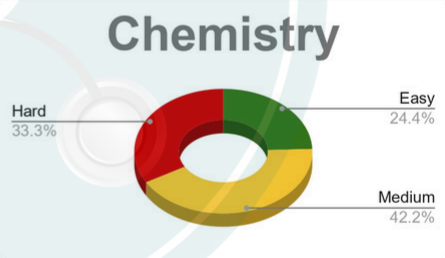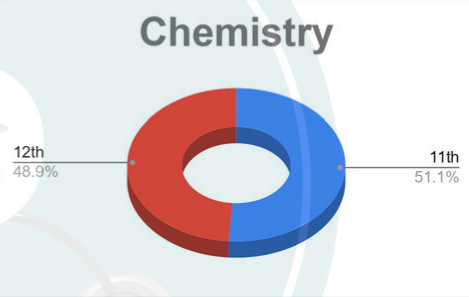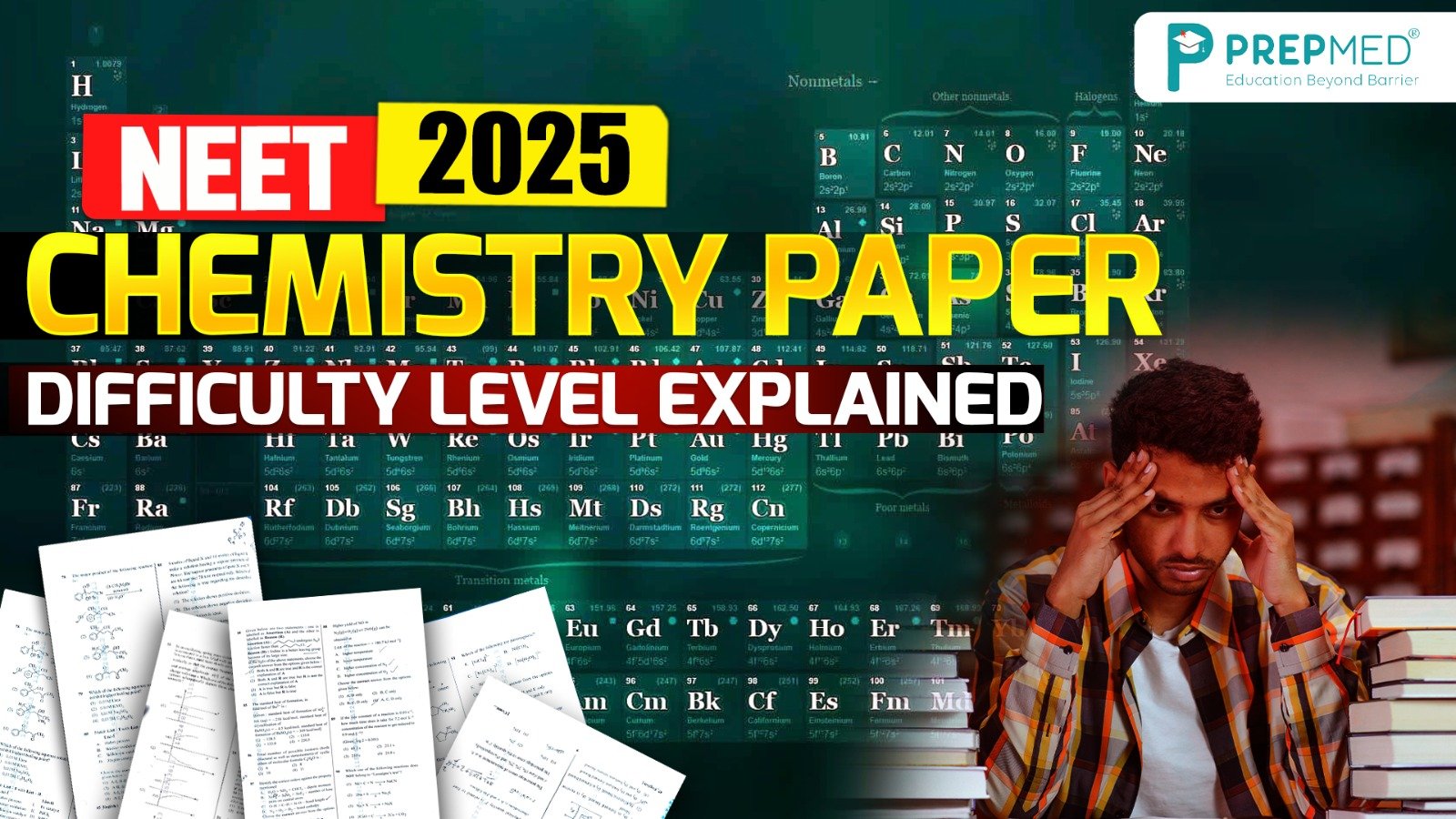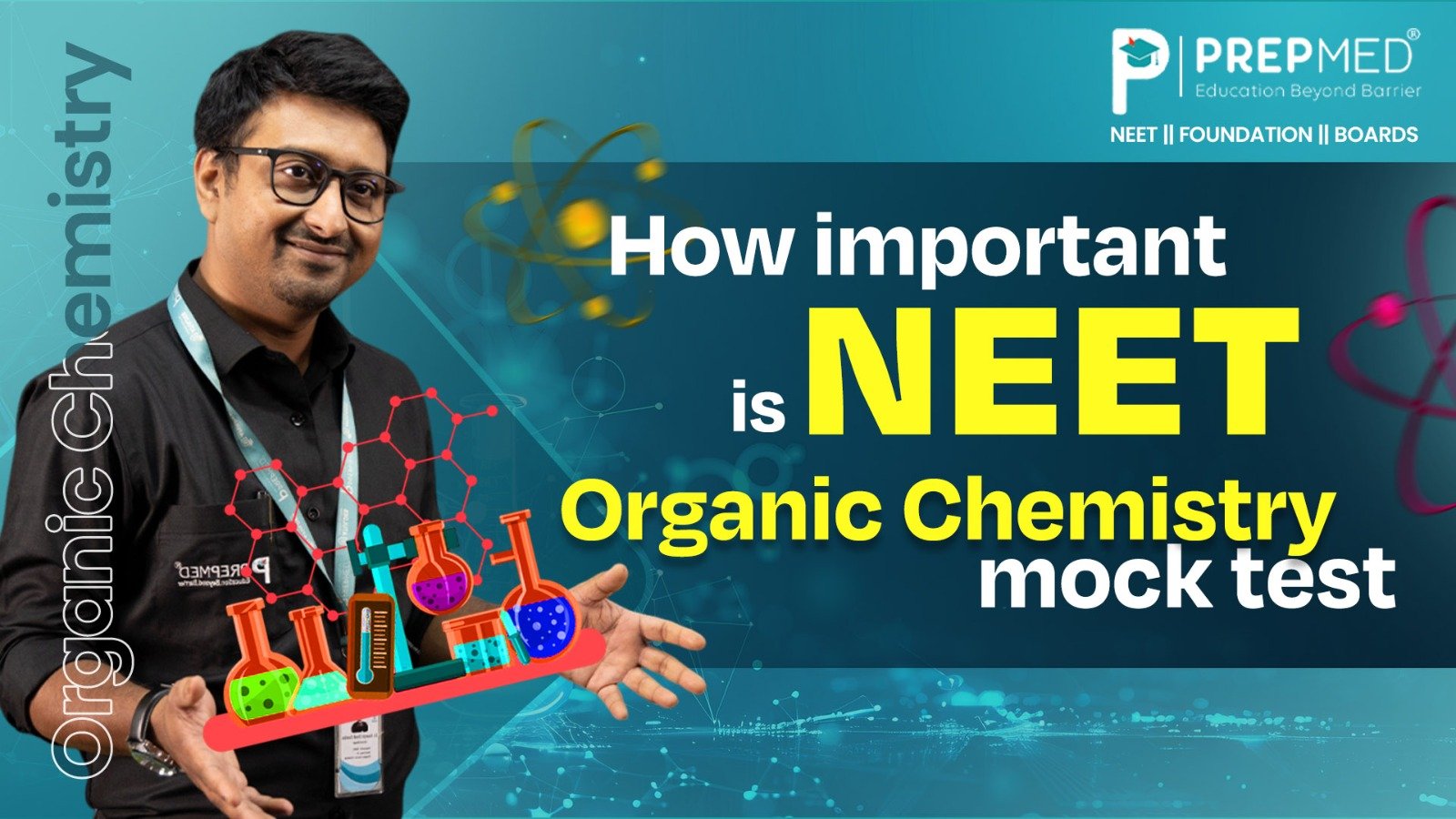May 10, 2025
NEET 2025 Chemistry Paper Difficulty Level Explained
The NEET (National Eligibility cum Entrance Test) is a test that lakhs of aspirants attempt every year, to get a seat in India’s best medical colleges. NEET 2025 was no exception, except, as always, it had its own surprises, especially in the Chemistry part. If you are a person who has tried or is aiming to try NEET in the future, then this extensive NEET paper review is a must read.
Fill up this form here to get a FREE expert guidance call from us:
Overall NEET Exam Difficulty Level For Chemistry Paper

The Chemistry section of NEET 2025 was a mixed bag for most candidates. Some students walked out confidently while others found the section rather tricky. Based on the majority of student feedback and NEET paper analysis by experts, NEET Chemistry paper was moderately difficult with a slight shift towards conceptual understanding rather than rote memorisation.
This year’s Chemistry questions were more concept and application-based questions compared to direct formula-based problems as compared to the previous years, especially NEET 2024. The challenge of the NEET exam in Chemistry therefore underwent a sharp increase, especially in the Physical Chemistry part.
Key Highlights:
- Emphasis on NCERT-based concepts.
- Some indirect and twisted questions, particularly in Organic Chemistry.
- Fewer direct formula-based numericals.
According to a student survey and expert reviews, the difficulty levels of the Chemistry section in NEET 2025 were distributed as follows:
- Easy: 24.4%
- Medium: 42.2%
- Hard: 33.3%
This fusion left students questioning their levels of preparation and the glaring question: The neither NEET exam is hard or easy, because it requires students to have a strong foundation in the 11th and 12th standards of their education. However, the difficulty of the exam varies depending on how well the students have prepared for it. The response for Chemistry is it depends on the level of your understanding of fundamentals.
Section-wise Analysis
Let's break down the NEET 2025 Chemistry paper section by section to give you a clearer picture.
Physical Chemistry
Physical Chemistry had a fair share of numerical problems and theoretical questions. While the numericals weren’t extremely lengthy, they required an in-depth understanding of the underlying concepts. Chapters like Thermodynamics, Equilibrium, and Electrochemistry had significant representation.
Observations:
- At least 4-5 questions were numerically based.
- Most questions were application-oriented rather than direct formula plug-ins.
- Questions from topics like Solid State and Surface Chemistry were challenging due to their abstract nature.
Difficulty Level: Moderate to Tough
Tip: A strong grasp of numerical solving techniques and conceptual clarity was essential.
Organic Chemistry
This was perhaps the trickiest part of the Chemistry section for most students. Organic Chemistry saw a number of mechanism-based and assertion-reason type questions. The questions weren’t straight out of NCERT but demanded a deeper understanding.
Commonly Covered Topics:
- Reactions and Mechanisms
- Named Reactions
- Biomolecules
- Chemistry in Everyday Life
Student Feedback:
- Questions were confusing and required multiple levels of reasoning.
- Some options were very close, leading to a lot of second-guessing.
- Many were unsure about the correct product or mechanism.
Difficulty Level: Moderate to High
Tip: Regular practice with mechanisms and conceptual mapping of reactions would have been extremely beneficial.
Inorganic Chemistry
Inorganic Chemistry was relatively easier, and most questions were NCERT-based. This part offered a breather for those who had stuck to the NCERT textbook religiously. There were more memory-based questions here, particularly from Coordination Compounds, Periodic Table, and Block Elements.
Student Feedback:
- Direct and straightforward questions from NCERT.
- A few tricky ones from chemical bonding and metallurgy.
- Overall scoring section for well-prepared candidates.
Difficulty Level: Easy to Moderate
Tip: Thorough NCERT revision and memorisation techniques were key.
Class-wise Distribution

The NEET 2025 Chemistry maintained a fairly balanced distribution of questions from Class 11 and Class 12 syllabi. However, there was a slightly higher weightage on Class 12 topics.
Breakdown:
- Class 11: Approximately 18–20 questions (51.1%)
- Class 12: Approximately 25–27 questions (48.9%)
This again stresses the importance of covering both syllabi thoroughly without neglecting one over the other.
Key Class 11 Topics:
- Thermodynamics
- Equilibrium
- States of Matter
Key Class 12 Topics:
- Coordination Compounds
- Organic Reactions
- Electrochemistry
The extra push from Class 12 chapters made it critical for aspirants to not just memorize but also apply their knowledge effectively.
Question Types and Patterns
A significant evolution noticed in NEET 2025 Chemistry was the diversity in the types of questions asked. There was a refreshing change in how some questions were structured—testing not just memory but critical thinking.
Major Patterns:
- Single Choice MCQs – 64.4%
These formed the backbone of the paper, focusing on core conceptual understanding.
- Statement I & Statement II Based – 8.9%
Required critical comparison of related ideas or principles.
- Multi-statement Questions – 11.1%
These tests a student’s ability to assess the truth value and relationships between multiple statements.
- Assertion and Reason Type – 2.2%
Limited in number but often tricky, especially in Organic Chemistry where logic chains mattered.
- Match the Column – 13.3%
Often involved cross-topic connections, adding an integrated problem-solving dimension.
The paper’s shift towards analytical thinking rather than simple recall-based questions highlighted the NTA’s focus on raising the quality of medical entrance testing.
Common Mistakes to Avoid
Even the best-prepared students can fall into traps that cost them marks. The NEET 2025 Chemistry highlighted some common mistakes significantly impacting student performance.
-
Overlooking NCERT: Thinking It’s Too Basic
- Many students believe the NCERT isn’t enough. While it's true for deep understanding, nearly 80–85% of Inorganic and a good chunk of Organic questions came directly or indirectly from NCERT.
- Skipping a thorough revision of the NCERT is a costly error.
- Misreading Assertion-Reasoning Questions
- These require careful reading. Several students made errors by jumping to conclusions without analysing both statements properly.
- Pro tip: Always read both statements separately first before comparing.
- Spending Too Much Time on One Question
- Time mismanagement can derail the entire paper. Though generally quicker, Chemistry had a few complex Organic questions that demanded more time.
- Set a maximum of 1.5 minutes per question and move on if it takes longer.
- Blind Spot Towards Physical Chemistry Numericals
- Several aspirants ignore numericals, thinking they’re too harsh. But once you master the formulas and concepts, they are some of the most scoring.
- Ignoring this section means giving up 15–20 easy marks.
- Skipping Conceptual Practice
- Rote learning reactions without understanding mechanisms and concepts will always lead to confusion when options are similar.
- Always know the why behind the what.
By avoiding these mistakes, aspirants can significantly improve their chances of mastering chemistry at NEET.
High-Weightage Topics
Success in NEET Chemistry often depends on focusing on high-yield topics. The NEET 2025 Chemistry confirmed the weightage patterns we’ve seen in recent years, with a few interesting shifts.
Most Important Topics from NEET 2025:
|
Topic
|
Approx. Questions
|
Difficulty Level
|
|
Thermodynamics
|
3
|
Moderate
|
|
Equilibrium
|
2–3
|
Moderate to Tough
|
|
Coordination Compounds
|
3
|
Moderate
|
|
Organic Reactions and Mechanisms
|
4–5
|
High
|
|
Biomolecules
|
2
|
Easy
|
|
Electrochemistry
|
2
|
Moderate
|
|
Chemical Bonding
|
2–3
|
Moderate
|
|
Periodic Table
|
2
|
Easy
|
What This Means for Future Aspirants:
- Focus your attention on these topics during the last 60 days of preparation.
- Allocate extra time in revision schedules to chapters like Coordination Compounds and Organic Mechanisms.
- Use tools like mind maps, reaction flowcharts, and concept videos for complex topics.
Impact on Overall NEET Performance
It’s easy to overlook Chemistry in favour of Biology, but that would be a huge mistake. With the NEET 2025 Chemistry being moderately challenging, the difference between average and top-performing students came down to 10–15 marks in Chemistry.
Why Chemistry is Crucial:
- It contributes 180 marks, the same as Physics and Biology (though Biology has 2x questions).
- A strong Chemistry score can compensate for a weak Physics section.
- It is often the determinant of ranking among equally scoring Biology students.
Score Distribution Insight:
- Top rankers scored 150+ in Chemistry.
- Average scorers continued to score between 90 and 120.
- Those who didn’t pay attention to conceptual clarity scored below 90, dragging their percentile down.
Conclusion
NEET 2025 Chemistry was full of surprises, challenges, and opportunities. The paper was a good ride for the students who were prepared conceptually and adhered to the NCERT. However, for those who had underestimated the analytical sharpness of this year’s paper, it turned out to be tricky.
The NEET exam is neither hard nor easy, as it depends on the individual's performance and the amount of effort they put in. For Chemistry, it was leaning towards challenging, but it was highly crackable with the right preparation strategy.
Ready to boost your NEET prep with expert-backed resources? Join PrepMed today for in-depth study material and real-time mock tests for NEET 2025 success.
FAQs
1. Was the NEET 2025 Chemistry tougher than previous years?
Yes, especially Organic Chemistry. The difficulty was a notch higher than NEET 2024, requiring deeper conceptual understanding.
2. Which section was the most challenging in Chemistry?
Organic Chemistry was the toughest due to its application-based, multi-layered questions.
3. How can future aspirants prepare effectively for NEET Chemistry?
Stick to NCERT, understand concepts deeply, solve previous year papers, and revise regularly using mocks and flashcards.
4. What resources are recommended for Chemistry preparation?
NCERT Textbooks, MS Chauhan for Organic, O.P. Tandon for Physical Chemistry, and NEET previous year question banks.
5. How significant is Chemistry in the overall NEET score?
Very significant. With 180 marks allotted, Chemistry can make or break your rank if candidates' Biology and Physics scores are similar.






